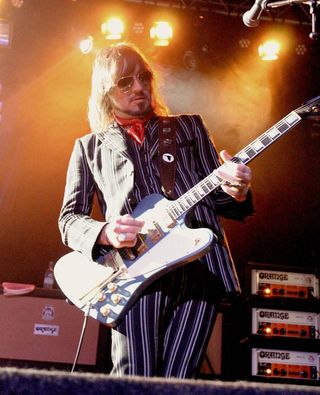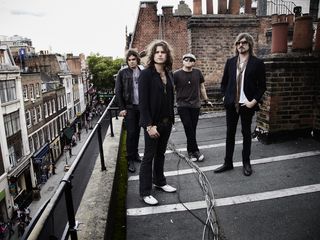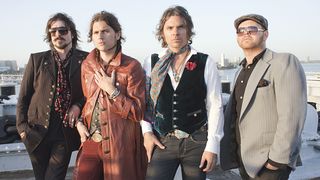If Head Down were Rival Sons' debut album and not their third release, we'd be heralding the unexpected arrival of a bright new talent, and possibly even an important one, a group that manages to take their cues from firmly established blues-rock paradigms while proving there's still rich, untapped pockets to be mined.
Oh, hell, let's dispense with the formalities and give it up for this California four-piece (singer Jay Buchanan, guitarist Scott Holiday, bassist Robin Everhart and drummer Mike Miley), who attack well-worn forms - there's also splashes of soul, funk and head-spinning psychedelia, for good measure - with a zeal that borders on audacity. The grooves are deep and the vocals are of the chest-beating variety, but the real star of the show is guitarist Holiday. On the album's 13 exhilarating cuts, he hits with with tectonic force, creating rich tapestries of sound that burst wide open with style, imagination and an infectious, warped charm.
We caught up with Holiday the other day to chat about his spunky approach to guitar playing, his many axes and sonic toys, and to find out how he felt rubbing shoulders with a new fan, another six-string slinger who goes by the name Jimmy Page.
So Jimmy Page likes your band. That's got to feel good.
"It's bizarre-o, isn't it? [Laughs] I don't think I have to hide my admiration for that band and how much Jimmy Page has influenced my guitar playing. He came to our show in Camden, which was slightly nerve-racking for a minute. I was remembering my nine-year-old self, listening to his records and thinking, Man, I wanna meet that guy! It was a crazy experience backstage - we had a few other celebrity-type people around - and then there he was.
"I made sure I set aside some vinyls for him, because I know he's a big collector. I got to meet him, gave him the vinyl, and we hung out and had chat. It was fantastic. We talked a little guitar, but we mainly talked about clothes. I was wearing a new suit that I had just received from a designer in London, and Jimmy complimented me on it. He knows a thing or two about fashion [laughs]."
On the Zeppelin tip, how does a young band such as yourselves use their influence while still trying to sound fresh and original?
"I'll tell you about that. Growing up, Zeppelin was such a signpost for me. Some kids have Beatles families, some kids have Stones families, but my family was totally into Led Zeppelin. The whole Zeppelin spirit was really ingrained into my soul.
"When this band came together, I knew our individual makeups were very much in line with Zeppelin, with our members mirroring theirs - a very Motown/soul-based bass player, a really bombastic drummer, an extremely blues-based guitar player and a blue-eyed soul/folk-based singer. Interestingly, the band never really listened to Zeppelin together. It's more kind of bred into us. We don't take too much directly from them at all."
You write some very strong riffs. What's your philosophy on coming up with the ultimate guitar patterns?
"I don't overcomplicate things. I don't write too many riffs when I'm sitting at home. To me, playing a riff is like giving a speech - the worst thing you can do is over-rehearse. You want to come off very natural, like it's spontaneous. So when we're in a studio, I just want to spit it out, you know?
"Keith Richards said something cool about this whole thing. He was asked if he records all of his music - how does he remember it all? And he just said, 'The stuff that's really good is the only stuff I'm going to remember anyway.' That makes a lot of sense. If I play something really cool, I'll keep that in the back, and I'll bring it out when we're in the studio. And that's the only place where we write: in the studio, where we're ready, recording, and we're in that moment."
Do you ever write riffs on an acoustic, and if so, do you notice a difference in the way they come out?
"Sure. I think it's less riffy if I'm writing on an acoustic. It'll usually be something in an open tuning and more blues based - for a riff, acoustically. I view the instruments pretty differently. I usually play an acoustic with just my hands - no pick. And I do a lot of slide stuff on acoustic too."
I'm curious about what you said before, that you only like to write in the studio.
"That's true. It's just more inspiring to be in the moment rather than play something that we might have done at soundcheck or whatever. It's literally like 'Here's what I got' - and I start playing. Keep On Swinging came together like that. I started playing it, the guys got inspired, and we pieced it together really quickly."

Holiday on stage with his blue Gibson Firebird VII Reverse. © Marie GC
The riff of that song plays off the drums in a Black Dog-like way. It reminds me of guitarist and drummer falling down the stairs and landing together on their feet.
"Yeah, yeah. Well, you know, obviously Pagey wasn't the first guy to do that. He took a lot from the old blues guys. It's that pentatonic thing. Some musicians, particularly jazzers, go, 'The minor pentatonic - it's so common, so tired!' But it's a very easy scale to hear; it's an easy progression to listen to. Falling on your feet, yeah. It's an easy progression for us to play."
When you come up with a riff like that, is it pretty obvious that it should be the backbone of the song?
"Absolutely. The riff came first for that song, and everything was built around it. And besides that song, when a riff is strong enough, we'll base things around it. You encircle it." [laughs]
Manifest Destiny, which is in two parts, is a real guitar epic. How did that come about?
"Thanks. The main riff came about between takes, much like a lot of things. I was just bumming about, and the producer heard me do this thing [imitates a guitar] - 'wah-ah-ah-ah-ah' - and he got on the talkback mic and said, 'That's amazing. I have it recorded, we're rolling, we're going to work on that right now.'
"I think I was taking a little bit from Spooky Tooth. When I had the form, I told the guys that I wanted to do a middle section that was more of a musical conversation and less of a solo. I didn't want to write bars, I didn't want to write sections - I just wanted us to talk. I said, 'I'll improvise, and I want you to just follow me.' I consider it an anti-guitar solo. It's not about how fast I'm playing or how cool the licks are. It's more about lyricism… painting a picture."
There's a little bit of a Stones Can't-You-Hear-Me-Knocking vibe to it.
"Yeah! Well, who can deny Mick Taylor? Yeah, that's the same idea - a band without boundaries just enjoying the conversation. That's been ingrained in my musical personality, along with Dazed And Confused and a lot of Hendrix stuff - Band Of Gypsies."
Your amp is getting quite a workout in that song. It sounds like it's breaking up!
[Laughs] "That amp is actually a 1930s Supro with a six-inch speaker in it. It's like the size of a Pignose amp, which I also used a lot on the record. That's a first take you're hearing. We did a first take, played it all through and put it on the record."
Part Two of Manifest Destiny is no less gonzo. Were they separate songs you decided to link together?
"That's right. Part Two is actually the first song we recorded. We didn't have them linked together musically until Jay had lyrics. He decided to write a story with a part one and part two."
And you're going ape on the guitar, even more so than on the first half.
[Laughs] "Thanks! I hope there's not too many wheelies and freak-outs. But yeah, that's what it is."

"The band never really listened to Zeppelin together," Holiday says. "It's more kind of bred into us."
What kind of guitars did you use on the record?
"On every record, I use a specific group of guitars, kind of like arrows in a quiver [laughs]. I used my live guitars: my blue Firebird VII Reverse, my '65 Non-Reverse, and my '62 Jazzmaster. Those all saw a lot of time. Plus there was my '54 Les Paul goldtop conversion. I used a really beautiful 1960 335 with the Bigsby - a really, really amazing guitar. Oh, and a Gretsch White Penguin.
"Let's see, what else… A lot of the rattier, garage-y stuff was done on a 1964 Harmony Rocket, which was most notably used by Dave Davies on a lot of the early Kinks stuff. I threw in a few more, like a really nice '66 Tele. I think that's a fair bit of the guitars I used."
Nice. Aside from the Supro and the Pignose, what other amps did you use?
"The Supro was the main one. It has one on/off switch and one volume knob, and if it got too hot, it would just melt. We had to turn if off all the time. Besides that, I used a Silvertone 1484 and a Vox Berkley. There were some other things - a Fender Princeton, some Blackface and Tweed Fenders."
How about effects?
"All sorts of things [laughs]. I'm a fuzz addict, man. I have some original Tonebenders. I use a Basic Audio Gnarly Fuzz, which is a take on a Maestro FZ1A. We also used a Super Fuzz, an Analog Man Peppermint Fuzz, a Rangemaster Clone and a Keeley Time Machine. Another big pedal was the KR Mega Vibe. There were a couple of wah pedals - a Dunlop CAE and an original Vox as well. Hmm… I actually used a Line 6 DL4 Delay Modeler. I had it modified by Keeley to spruce it up a little. That's a great pedal."
You've certainly got a nice collection of toys. [Holiday laughs] Tell me, is there a particular guitar you still lust after?
"Not one guitar. The 1960 335 is a pretty incredible guitar. I'd really love to get a late '50s/early '60s 335. I can't really deny the mid-'50s Les Pauls, although I'm not really a Les Paul guy. On my list is a first-year Firebird, so that would be the guitar I'm looking at now. There's not one guitar I covet - there's a group." [Laughs]
Head Down is out now in the UK. The album will be released in the US on 22 January 2013.


